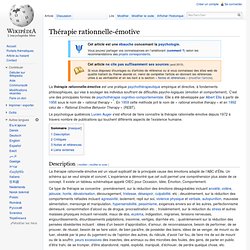

ReviewofRationalEmotiveBehaviorTherapy. Dr Jim Byrne - The roots of the "individual" are "social and relational" Interesting paper - I tend to agree, in part, with this assessment. Obviously, we are also partly genetic beings, as well as environmental beings, and social beings (as is products of our societies: laws, governments, means of production, etc.). This paper is based in the CENT (Cognitive Emotive Narrative Therapy) model of psychology developed by Dr. Jim Byrne. I like the idea behind this approach. Virtue ethics; and general moral philosophy;Transactional analysis and other forms of brief psychodynamic therapy;Critical thinking skills, and moral reasoning abilities;Zen Buddhism;Other forms of philosophy and psychotherapy. 4.
This is the ninth of ten papers written by Dr. The "Individual" and its Social Relationships - The CENT PerspectiveCopyright (c) Dr Jim Byrne, 30th December 2009 1. Figure 3: Freud's model of the psycheIn this model, the id is shown to be unconscious, which is an unfortunate term that I find quite confusing. What is Rational Emotive Behavior Therapy (REBT)? - REBT Network: Albert Ellis. What is REBT? Rational Emotive Behavior Therapy (REBT) is a form of psychotherapy and a philosophy of living created by Albert Ellis in the 1950's. REBT (pronounced R.E.B.T. — it is not pronounced rebbit) is based on the premise that whenever we become upset, it is not the events taking place in our lives that upset us; it is the beliefs that we hold that cause us to become depressed, anxious, enraged, etc.
The idea that our beliefs upset us was first articulated by Epictetus around 2,000 years ago: "Men are disturbed not by events, but by the views which they take of them. " The Goal of Happiness According to Albert Ellis and to REBT, the vast majority of us want to be happy. Of course life doesn't always allow us to have what we want; our goal of being happy is often thwarted by the "slings and arrows of outrageous fortune. " The ABC Model Albert Ellis and REBT posit that our reaction to having our goals blocked (or even the possibility of having them blocked) is determined by our beliefs. Thérapie rationnelle-émotive. Un article de Wikipédia, l'encyclopédie libre.

La thérapie rationnelle-émotive est une pratique psychothérapeutique empirique et directive, à fondements philosophiques, qui vise à soulager les individus souffrant de difficultés psycho-logiques (émotion et comportement). C'est une des principales formes de psychothérapie cognitivo-comportementale. Elle a été développée par Albert Ellis à partir de 1956 sous le nom de « rational therapy »[1].
En 1959 cette méthode prit le nom de « rational emotive therapy » et en 1992 celui de « Rational Emotive Behavior Therapy » (REBT). Le psychologue québécois Lucien Auger s'est efforcé de faire connaître la thérapie rationnelle-émotive depuis 1972 à travers nombre de publications qui touchent différents aspects de l'existence humaine. Description[modifier | modifier le code] La thérapie rationnelle-émotive est un visuel explicatif de la principale cause des émotions adapté de l’ABC d'Éllis.
Critiques[modifier | modifier le code] Portail de la psychologie.